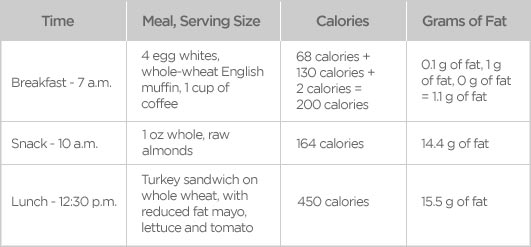Americans expect results, and they expect them fast. Perhaps that's why fad diets and home gyms that promise miracle weight loss are so popular. With all the hype surrounding food diaries, they might seem as though they're just another fad. So the question remains, does recording your food intake actually help you lose weight?
Americans spend almost $35 billion on weight-loss products, but studies show that logging your food intake may be one of the most effective methods. A study conducted at Kaiser Permanente's Center for Health Research found that keeping a food diary doubled participants' weight loss. Those who kept a food diary five days a week lost twice the weight of those who didn't, and, most importantly, they kept it off.
What is a food diary?
A food diary, or food journal, is similar to a regular diary or journal. Instead of writing down everything you did that day, the entry consists of what you ate during the day. The most effective diaries are the most comprehensive. An effective entry would include the food or drink consumed, the time it was eaten, the amount eaten, calories, and grams of fat. Even simply writing down the foods you eat in a day and your daily activity can improve your weight loss. Here, a sample of an effective diary.

5 Reasons Why Food Diaries Work
Still skeptical? Unlike other products which promise results they can't deliver, the food diary forces you rely on yourself. Self-reliance is the most useful tool in the weight loss journey, and food journaling acts as a catalyst for it.
1. Awareness. In your first week of keeping your diary you may have an "Ah-Ha!" moment. You may be surprised by the amount you eat and the quantity of calories. This moment may help you swing your diet into gear.
2. Monitoring. Your food diary allows you to keep track of calories and fat intake, two crucial elements of your diet. By monitoring how much goes into your body, you may be more compelled to keep these numbers low. In fact, the Kaiser Permanente study found that because the participants showed their diary to someone else regularly they felt more accountable. As a result, they lost an average of thirteen pounds during the six-month duration.
3. Focuses. Physically recording what you eat will focus your food choices. If you ate well all day, you may not want to taint your record by adding cheesecake to the list. It will help you make sure your diet is balanced and can curb any desire to binge. Again, this aspect relates back to the accountability aspect of the diary. A 2002 study conducted by the Diabetes Prevention Program found that participants trained in food journaling were better at overcoming common weight-loss obstacles. For example, they made healthier decisions at restaurants and were better at not overeating during social occasions.
4. Progress. A great moment in the food journaling process is seeing how far you've come. A successful food diary will have entries each day that look better than the days, weeks, or months before it.
5. Reinforcement. Keeping a food diary reinforces your commitment to a healthy diet and lifestyle. Every time you make an entry, you make a promise to yourself to keep on with your healthy intent.





